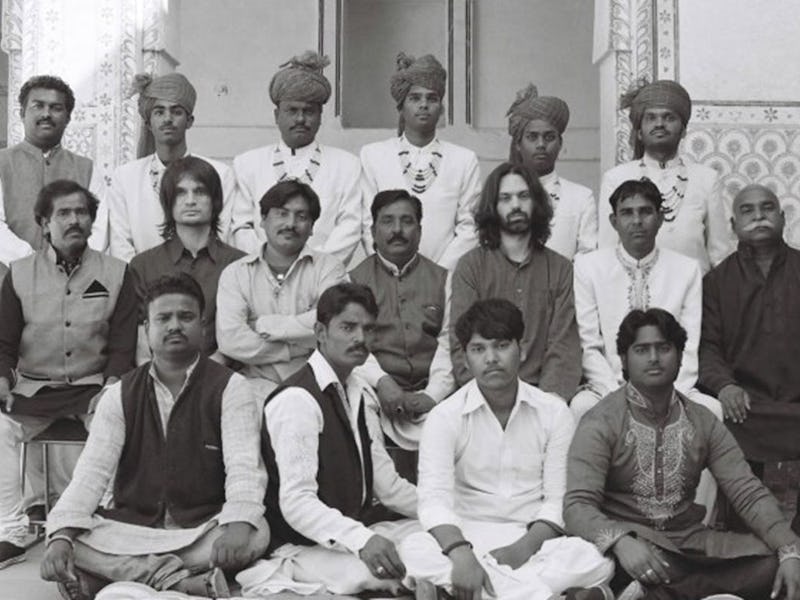Where Will 'Junun' Fit in Paul Thomas Anderson's Filmography?
The scrappy music documentary streaming on MUBI is unlike anything Anderson has ever done.

Until now, Paul Thomas Anderson movies were big-screen event films. He made ‘em that way. The wide-open American landscape strewn with oil in There Will Be Blood cried out to be seen in a large format. The 70mm stock of The Master literally couldn’t get any bigger for that type of film. And the broad, 1970s psychedelic mystery of Inherent Vice never looked better than in a movie theater. All that changes with Anderson’s new movie Junun, a 54-minute documentary that just premiered on streaming site MUBI.
The nearly wordless doc, shot quickly last February, tracks Radiohead guitarist Jonny Greenwood and Israeli musician Shye Ben Tzur making an album with a group of local musicians in the 400-year-old Mehrangarh Fort in Rajasthan, India. Though a select few had the chance to see Junun on the big screen at this year’s New York Film Festival, everyone else will have to make do with computers and TV screens.
Going small is a surprising move from Anderson, one of the loudest proponents of film among a select group of nearly autonomous auteurs. But he’s always maintained that the format of his movies is based largely on the ideas . In 2013 when asked about using film, and specifically 70mm stock, he told fansite Cigarettes & Red Vines, “It would have to be the right story. That’s the deciding factor for sure. I really hope we see more and more of it in use.”
It seems the low-key, understated Junun didn’t warrant a more cinematic approach. Perhaps Anderson sensed the project was fit for a small-screen rollout. On the surface it bears little resemblance to Anderson’s previous work, primarily because it’s a non-theatrical, nonfiction release. But it’s also the first time Anderson has dabbled in digital filmmaking, a far cry from the bulky 70mm cameras that made The Master an essential big-screen experience.
In Junun, Anderson has made an idiosyncratic, free-spirited film. It begins with a single shot panning around a room of musicians playing trumpets, singing, strumming guitars, and clapping. Leading the group is Tzur, a Jesus-like figure with a resplendent beard to match his flowing locks. Usually off to the side is Greenwood, hiding behind his mop of hair while plucking whatever instrument he happens to be holding. When it isn’t presenting full performance vignettes at the fort, the film fleshes out the rest of the complex group with fragmented moments. They lounge around, go into town to get their instruments tuned, kill time by taking naps when the electricity goes out, or chase birds out of the jerry-rigged studio space.
There’s a loose, wandering quality to the scenes matched only by the scrappiness when it picks back up with each performance. There’s no real insight to what is going on, and the audience simply follows along by listening to the songs. Here, the movie transcends a mere behind-the-scenes music documentary. Instead it then presents its almost home-movie-like qualities. The camera constantly blurs into focus; the camera-person picks up and reframes shots in a herky-jerky motion; people walk in front of the camera; a constantly hovering, consumer-grade drone offers pixelated shots. By being relatively sloppy, it makes the proceedings that much more intimate, matching the vibe of the music-making. It makes Junun the most adventurous Paul Thomas Anderson movie to date.
The movie meanders, but never outstays its welcome over its slender hour. Part of the push and pull is Anderson’s benign intrusion into the cultural divide on display, connecting to Anderson’s bigger, much more polished oeuvre. Junun conveys the sense of fitting in from Boogie Nights, the ambling nosiness of Inherent Vice, the desire to understand one another from The Master, and pulling together disparate ensemble threads from Magnolia.
To some, Junun will be nothing more than an experiment better suited as a DVD extra. Looking deeper, it shows Anderson is willing to depart from his habits. In it, he remains a genius whose work is difficult to predict or classify, in the best way possible.
Junun is available to stream exclusively on MUBI right now.